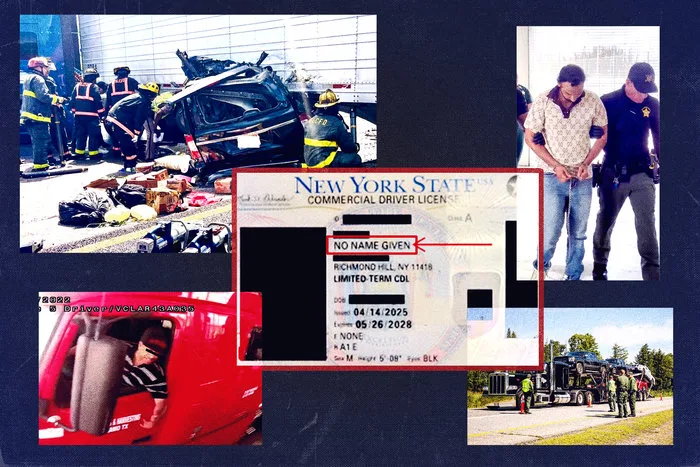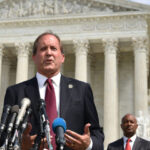By Allan Stein
FLAGSTAFF, Ariz.—A fully loaded semi-truck barreling down the interstate is like a 40-ton projectile on 18 wheels. In the hands of an untrained driver, it becomes a potential weapon, according to Richard, a truck driver from Oklahoma.
“They don’t stop on a dime, I’ll tell you that,” Richard said as he walked into the Little America truck stop off the I-40 in Flagstaff, Arizona.
Richard, bearded with long hair and a bandana, said he hasn’t been driving long. But like other truckers, he’s already seen plenty of foreign drivers behind the wheel of these huge trucks.
He doesn’t know who has had proper training and who hasn’t. What he does know is that he paid $4,300 for a six-week truck driving course where he learned the fundamentals of road safety.
Like growing numbers in the trucking industry, Richard is concerned, applauding a recent undercover effort to get illegal immigrant truck drivers off the road and out of his home state. Some of these drivers were “No Name Given” commercial license holders, meaning they are people from other countries certified without showing proper ID.
Such loopholes are now in the crosshairs of the Department of Transportation, following a federal review that found that some states have issued licenses to foreign drivers in error, and after a recent series of deadly crashes involving foreign drivers.
The rigors of obtaining a license are still fresh for Richard, who got his commercial driver’s license recently.
Most passed the tough course. Others did not, he said.
“Some people struggled with it. But it’s very thorough,” Richard, who didn’t want his last name used, told The Epoch Times.
“From what we learned in terms of safety, it’s just knowing who’s on the road.”
Richard said he supports stricter state and federal rules for anyone driving an 80,000-pound semi, because public safety is at risk.
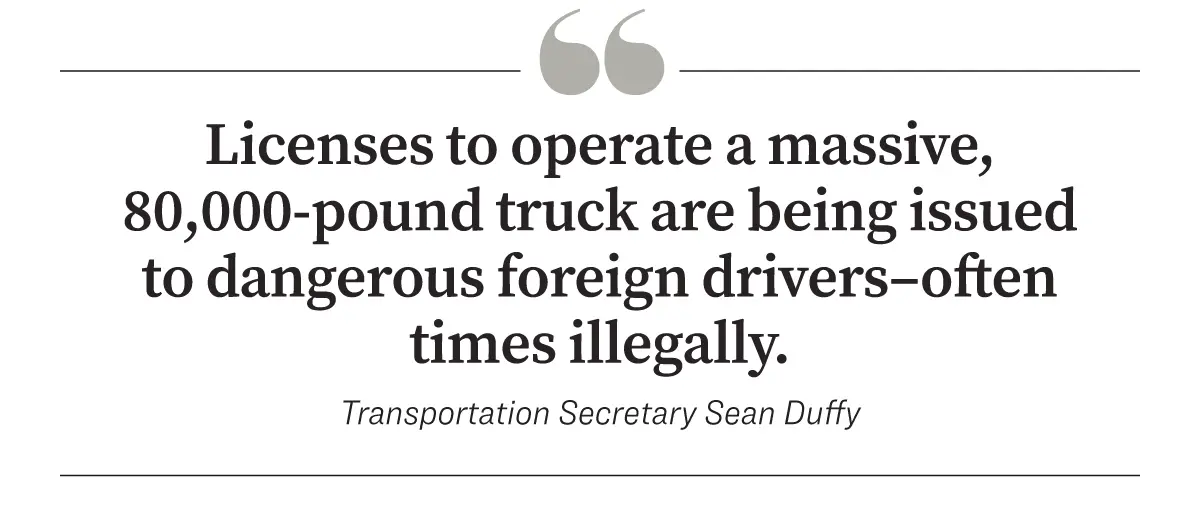
A recent study by the trucking magazine Overdrive found there are about 60,000 active “non-domicile” commercial license holders who work but do not live in the United States.
The study was based on a detailed check of records in all 50 states.
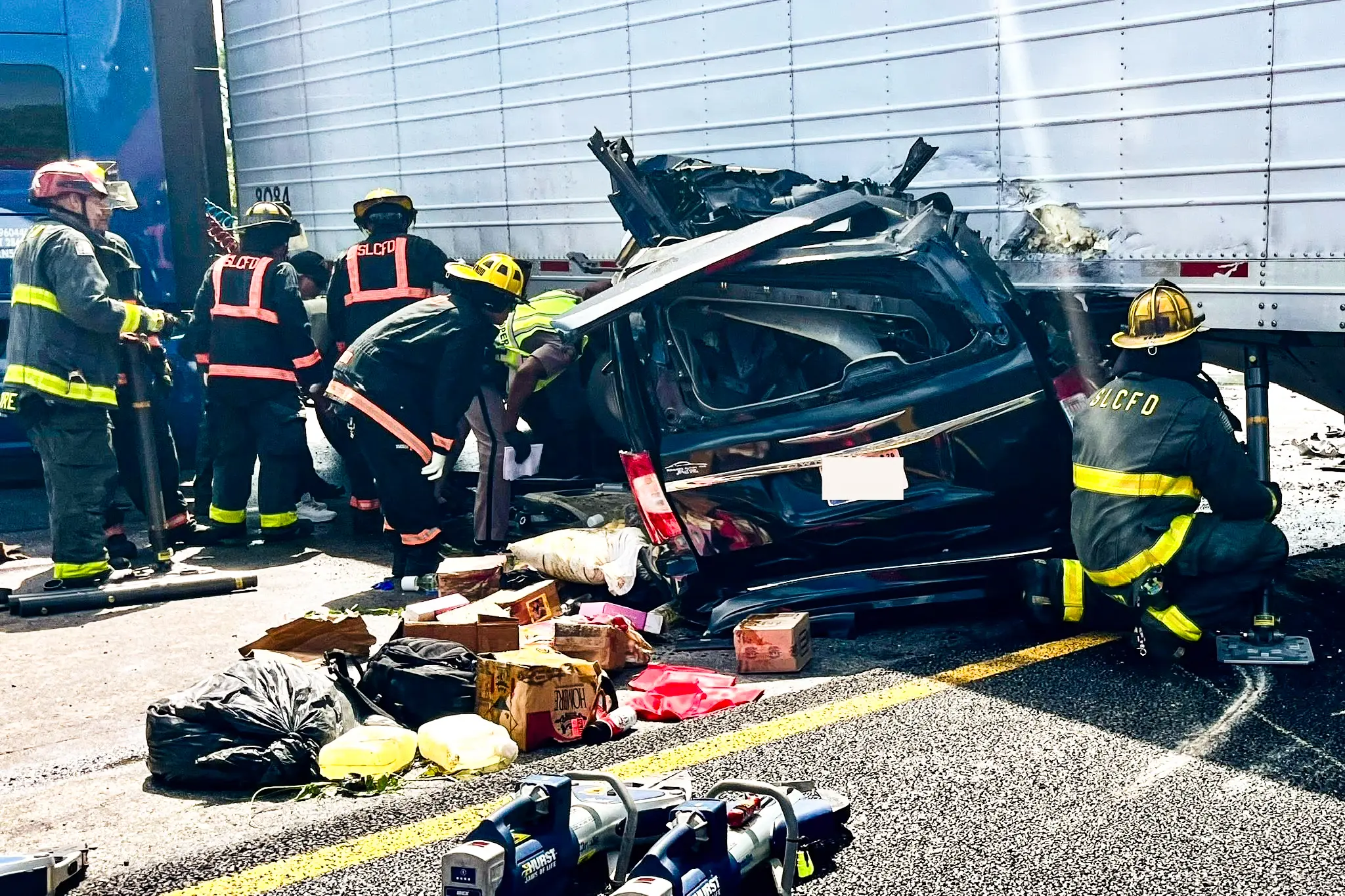
On Sept. 29, Oklahoma Gov. Kevin Stitt said that more than 125 illegal immigrants were caught during Operation Guardian, a focused three-day effort by state and federal immigration officers along I-40 in western Oklahoma.
Most of the people arrested during the operation came from countries such as India, Uzbekistan, China, Russia, Georgia, Turkey, Tajikistan, Ukraine, and Mauritania.
The operation stopped several illegal immigrants using truck driver’s licenses given out by states that shield those who are in the United States illegally.
On Oct. 10, the Department of Homeland Security (DHS) said Oklahoma authorities arrested a man from India who entered the country illegally in 2023 and was released under the Biden administration.
The Oklahoma Highway Patrol pulled over the driver for a check at a truck scale on I-40 on Sept. 23 as part of Operation Guardian.
When the troopers asked for identification, the man gave them a New York commercial license with the entry “No Name Given Anmol.”
“If New York wants to hand out CDLs to illegal immigrants with ‘No Name Given,’ that’s on them,” Stitt said in a statement.
“The moment they cross into Oklahoma, they answer to our laws. This is about keeping Oklahomans safe.”
In a statement, DHS Assistant Secretary Tricia McLaughlin said, “Allowing illegal aliens to obtain commercial driver’s licenses to operate 18-wheelers and transport hazardous materials on America’s roads is reckless and incredibly dangerous to public safety.”
McLaughlin identified New York as a major culprit and said the state is failing to verify whether people applying to drive 18-wheelers are U.S. citizens.
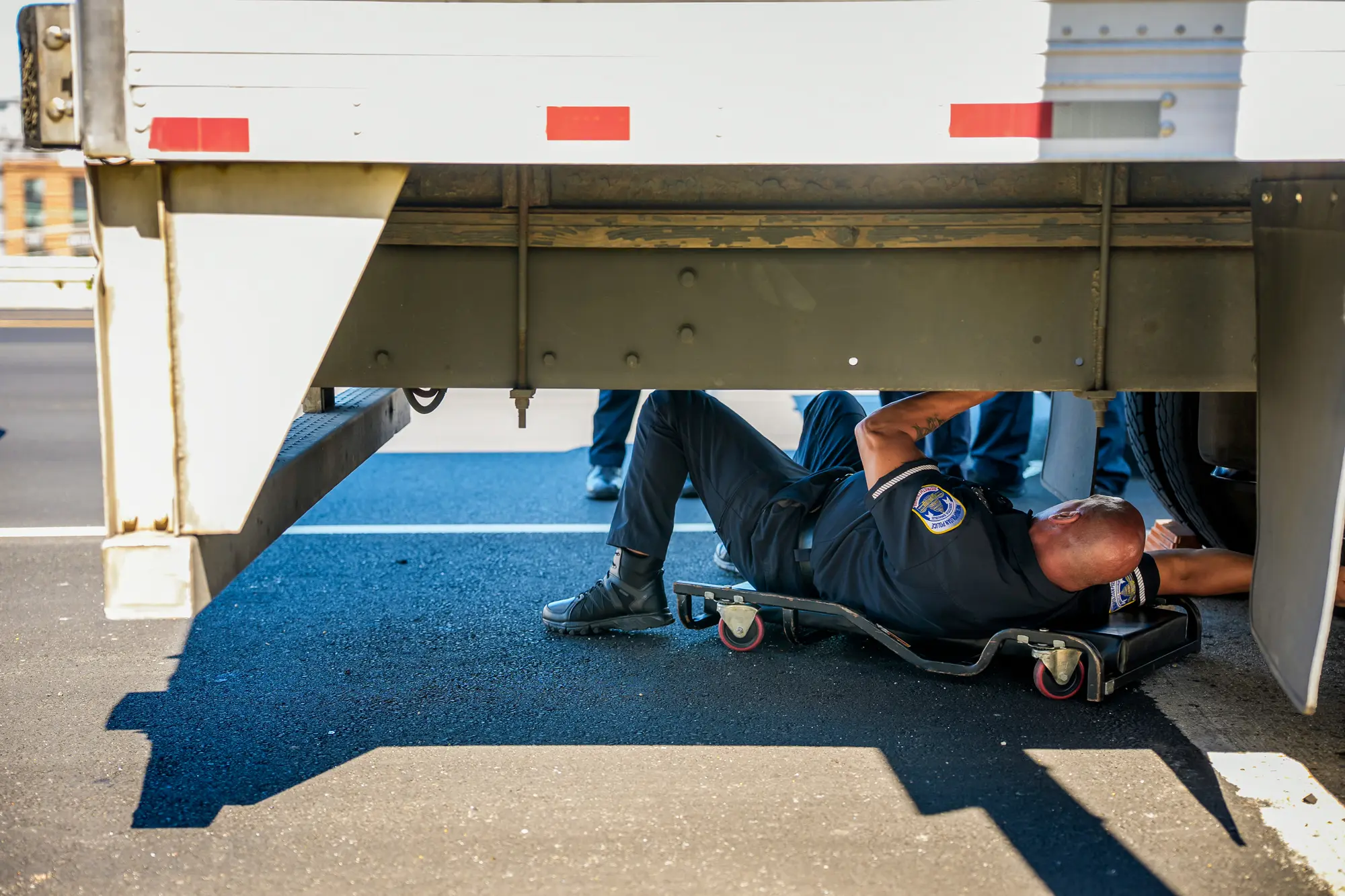
She added that the state is not collecting the full legal names of those receiving commercial driver’s licenses.
Walter McLure, a spokesperson for the New York Department of Motor Vehicles, told a New York publication that Anmol’s CDL was issued on April 14 and will be valid for five years.
McLure said the process was done correctly, used a federal work document, and showed the driver was in the United States legally.
After several fatal accidents involving illegal immigrant truck drivers since January—including one in Florida that killed three people—the federal government has launched new measures to prevent similar tragedies.
On Sept. 26, Transportation Secretary Sean Duffy announced emergency rules that will make it harder for about 200,000 drivers to obtain commercial learner’s permits and commercial driver’s licenses (CDLs) if they do not live in the United States.
The rule took effect immediately after a nationwide review by the Federal Motor Carrier Safety Administration (FMCSA) and a recent series of deadly crashes involving non-domiciled foreign drivers.
The review found that some states have issued licenses to foreign drivers in error.
It also showed tstatemenhat the current rules may not work, even when people follow them.
The FMCSA said these problems have created a serious safety risk on U.S. roads that needs to be fixed.
“What our team has discovered should disturb and anger every American,” Duffy said in a statement.
“Licenses to operate a massive, 80,000-pound truck are being issued to dangerous foreign drivers–often times illegally.”
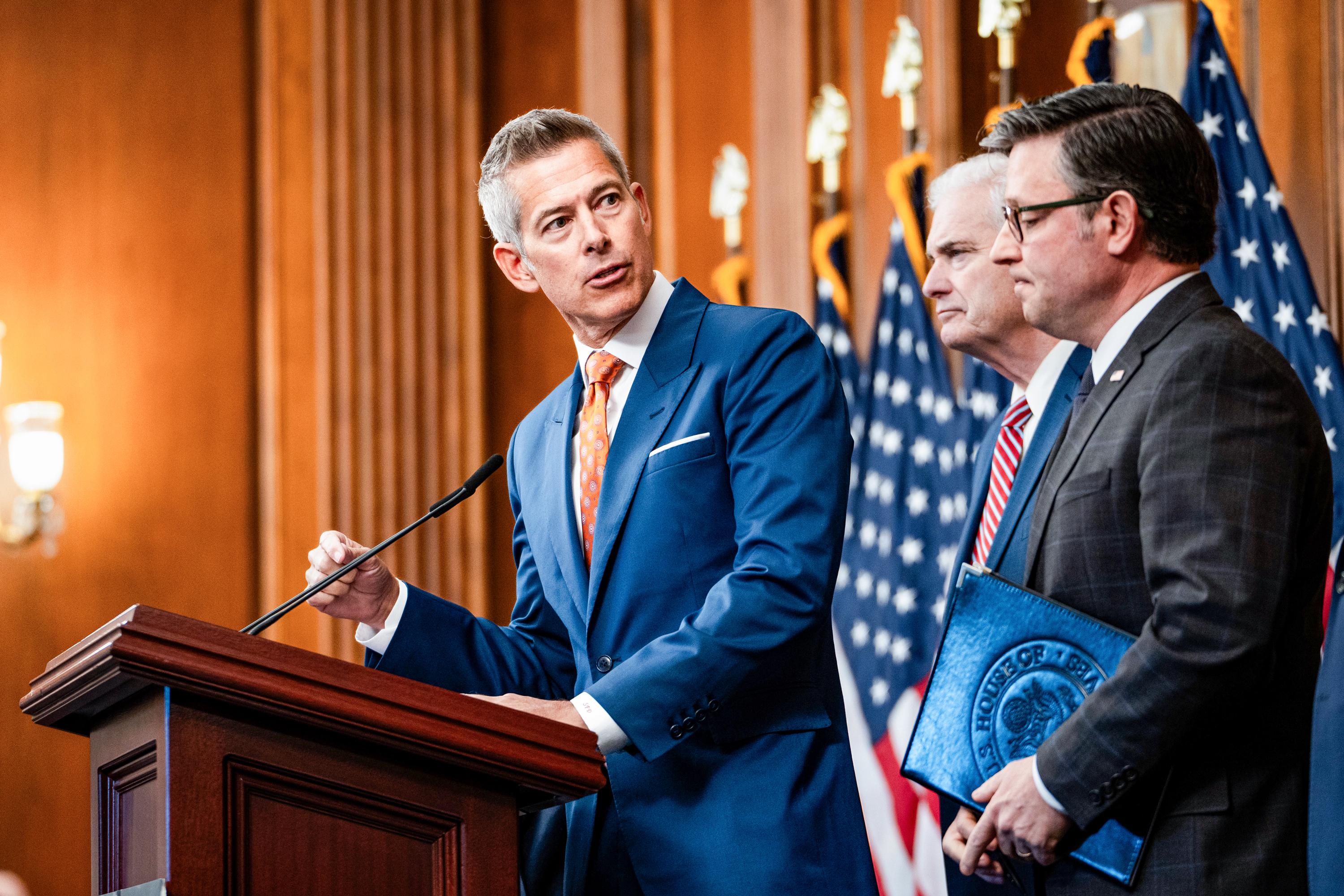
A nationwide FMCSA audit of non-domiciled CDLs found widespread noncompliance in several states, with California showing the most serious issues.
The agency found that lack of supervision, insufficient training, and computer program mistakes led to many non-domiciled CDLs being given to drivers who should not have received them, including some whose permission to be in the United States had expired.
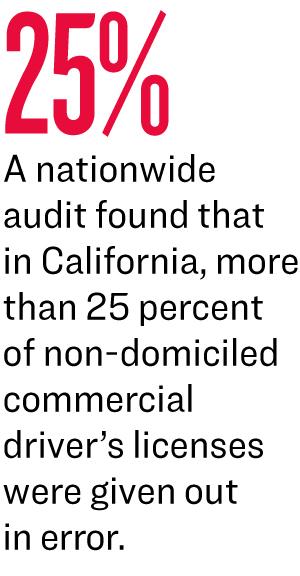
The review found that in California, more than 25 percent of non-domiciled CDLs were given out in error.
Duffy said this problem allows thousands of unsafe drivers to stay on the road and told California to stop issuing non-domiciled CDLs immediately.
In addition, California must identify all unexpired non-domiciled CDLs that fail to comply with FMCSA regulations.
Finally, it must revoke all noncompliant non-domiciled CDLs and reissue them only if they meet the new federal requirements.
California has until next week to comply with the order or risk losing nearly $160 million in federal highway aid.
In a Sept. 26 letter to California Gov. Gavin Newsom and state Department of Motor Vehicles (DMV) Director Steven Gordon, the FMCSA said if the state does not fix the problem soon, the agency may also take away approval for the state’s commercial driver’s license program.
California has temporarily stopped giving out certain commercial driving permits and licenses to people who do not have full legal status in the United States while it reviews the DOT’s Oct. 15 notice.
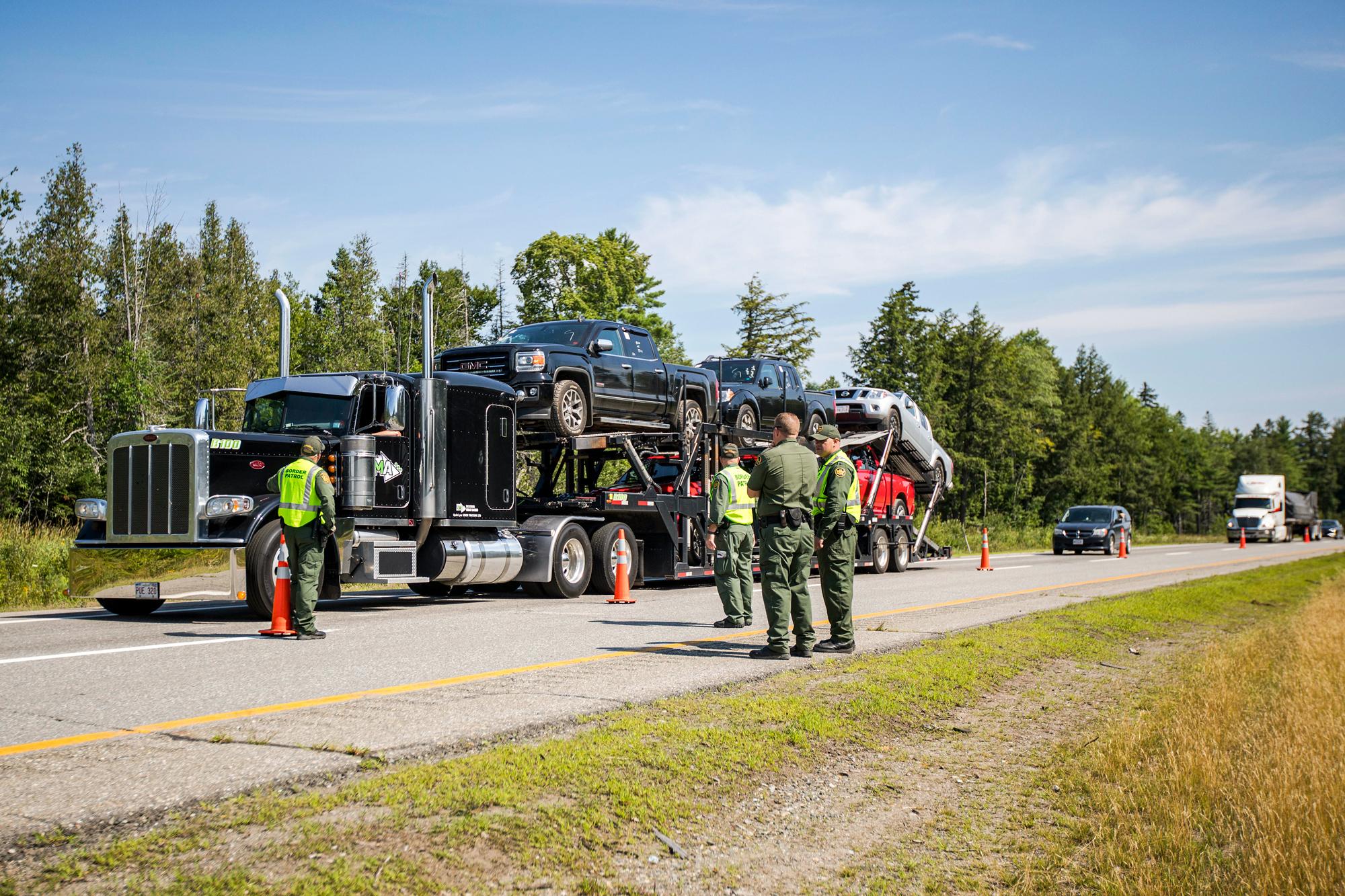
This pause includes new licenses, renewals, replacements, corrections, upgrades, transfers, and requests that are still being processed.
“California remains committed to the safety of the traveling public and will continue to comply with applicable federal laws and regulations,” a California State Transportation Agency spokesperson told The Epoch Times.
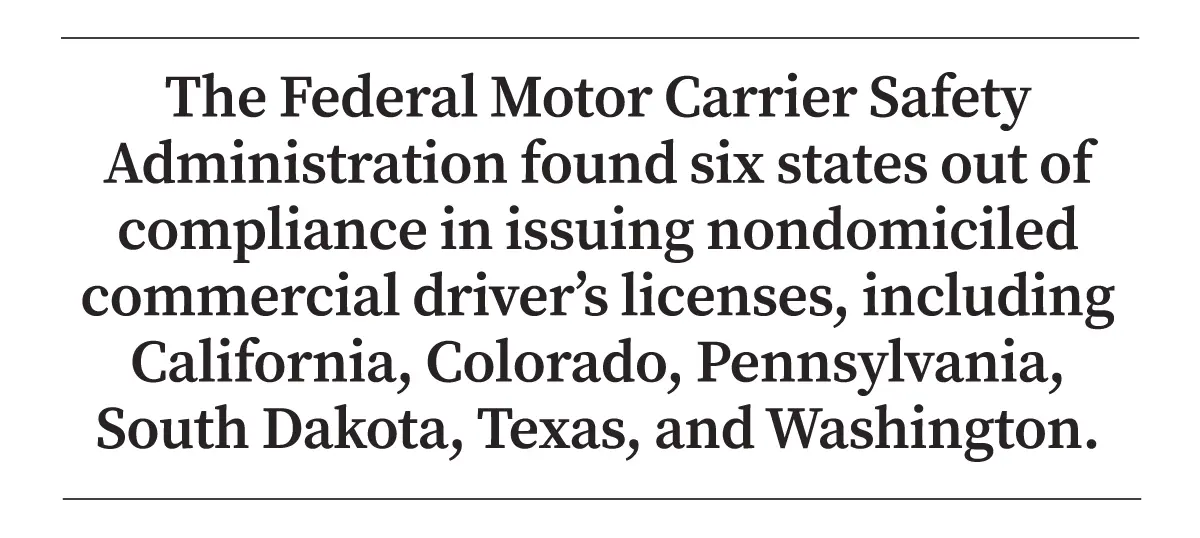
However, the agency stood behind its Sept. 25, 2025, response to the FMCSA in which it stated that California is in full compliance with the rules of the Motor Carrier Safety Program, all federal rules, and its approved Commercial Vehicle Safety Plan.
The DMV believes that California’s laws and rules, including those about English skills for commercial drivers, are the same as or work the same way as federal rules.
It said California checks English skills when people apply for a commercial driver’s license. The written and driving tests are only in English and do not allow interpreters, the letter stated.
The state has added the April 1, 2024, version of the Commercial Vehicle Safety Alliance’s Out-of-Service Criteria to its rules, as required by federal law.
The FMCSA’s review found that other states that are not following the rules in how they give out non-domiciled CDLs include Colorado, Pennsylvania, South Dakota, Texas, and Washington.
The Epoch Times contacted the motor vehicle licensing agencies in all six states named in the DOT review, and all but Colorado responded.
The Texas Department of Public Safety (DPS) directed The Epoch Times to its Sept. 29 statement about suspending the issuance of certain commercial driver’s licenses.
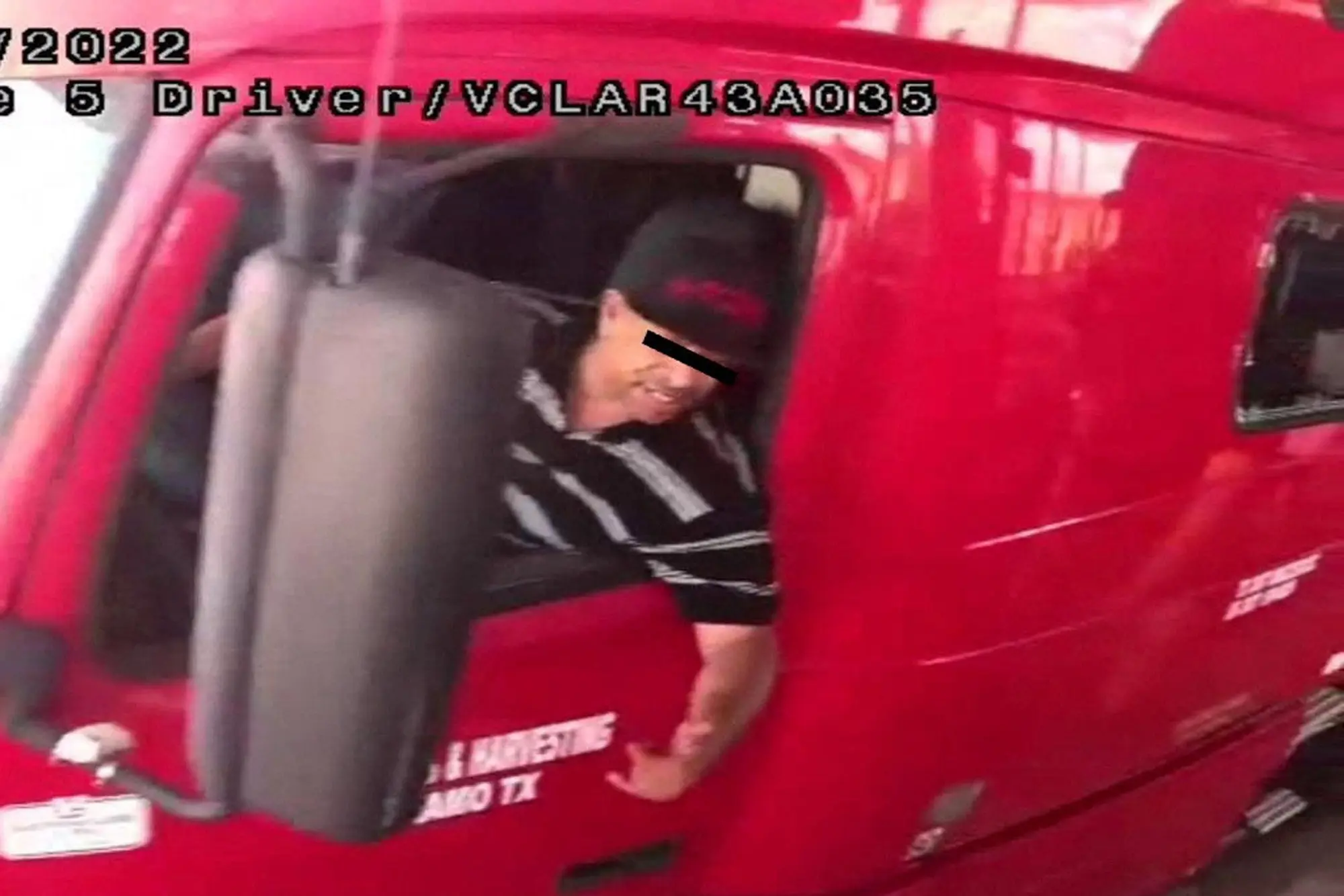
The suspension covers non-domicile CDLs, as well as all CDLs held by noncitizen refugees, asylum-seekers, and recipients of Deferred Action for Childhood Arrivals (DACA), an immigration policy that temporarily delays the deportation of people who illegally entered the United States as children.
It also applies to non-domicile commercial learner permits and those held by noncitizen refugees, asylum-seekers, and DACA recipients.
“The department has never issued any type of license to asylum seekers who have not been approved for lawful presence,” the Texas DPS added.
Early in September, Texas Gov. Greg Abbott told DPS Commercial Vehicle Enforcement officers and inspectors to start checking the English skills of commercial vehicle drivers on Texas roads.
South Dakota does not issue commercial driver’s licenses to illegal immigrants, and licenses for non-domiciled drivers are currently on hold, according to Brad Reiners, director of communications for the South Dakota Department of Public Safety.
“Once South Dakota is ready to start issuing non-domiciled CDLS, we will comply with the new mandate,” Reiner told The Epoch Times.
In Pennsylvania, the Department of Transportation told The Epoch Times it has temporarily stopped issuing, renewing, transferring, replacing, and updating non-domiciled commercial driver licenses and learner permits while it reviews the new federal rule.
A PennDOT spokesman said Gov. Josh Shapiro is also reviewing the economic impact the rule will have on Pennsylvania.
A spokesperson for the Washington State Department of Licensing told The Epoch Times that the agency is working to meet compliance requirements and is not currently processing non-domicile CDL transactions.
On Oct. 9, the American Trucking Associations (ATA), a leading industry group, sent a letter to Congress asking for new laws to improve training, testing, and licensing for CDL holders to make roads safer.
“Though commercial trucking is among the most heavily regulated industries in the United States, gaps in oversight, enforcement, and qualification requirements … threaten safety on our nation’s highways,” ATA President and CEO Chris Spear said in a statement.
Along with urging Congress to address dangerous loopholes, ATA highlighted concerns about “cabotage.”
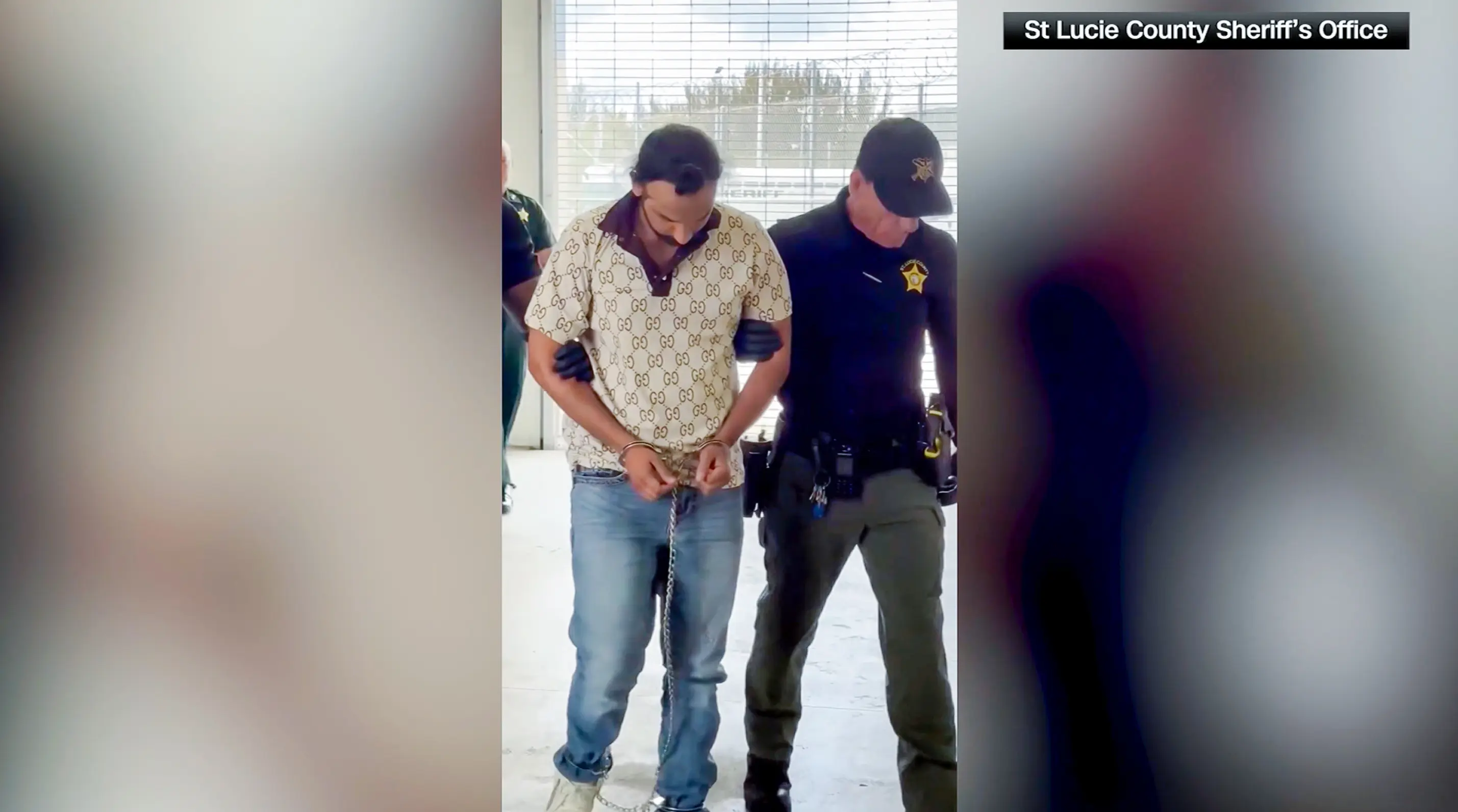
This illegal practice, where companies from other countries handle U.S. freight, threatens the stability of U.S. carriers, the organization warned.
Chris Hernandez, 45, a Mexican immigrant, has lived with his family in Arkansas since 2022. He has been driving big trucks for 26 years and often sees the problem of improperly trained foreign drivers on the road.
“You see it every day,” said Hernandez, sitting in the cab of his tractor-trailer parked in the Little America truck lot in Flagstaff. “You don’t know if they got trained or anything.
“I emigrated here from Mexico, but I went through training over 20 years ago. A lot of them don’t even have the training.”
Hernandez believes it’s very important for a commercial driver’s license to include the license holder’s full name and other key identifying information.
When a poorly trained or untrained commercial truck driver slips through the cracks, obtains a license, and gets into an accident, “they lump everyone into that—we get all lumped into it,” he said.
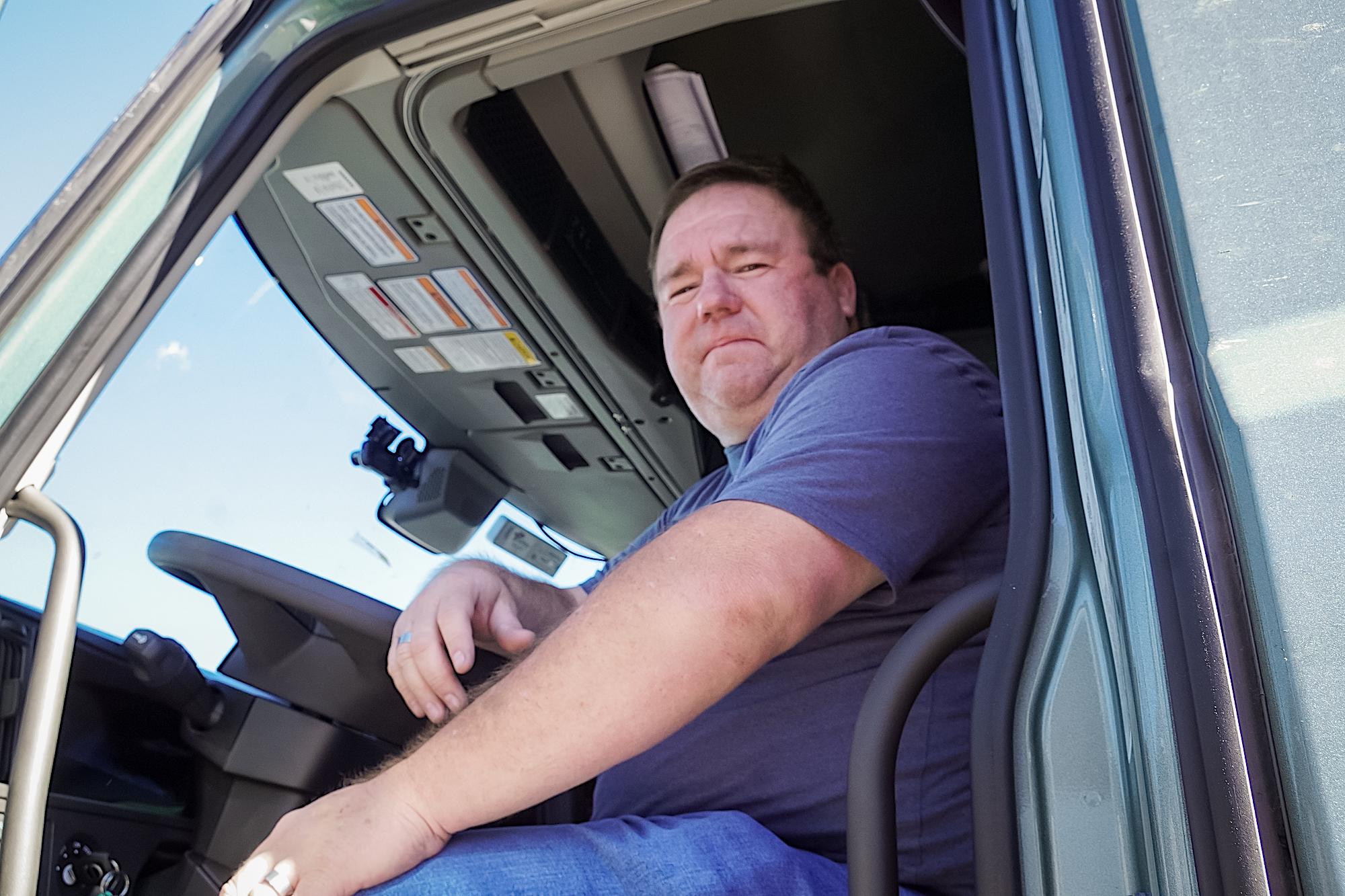
José Vasquez is a commercial truck driver from Tijuana, Mexico. On his way to Chicago, he made a stop in Flagstaff.
He said that when he got his license in Mexico, he had to provide his full name, address, phone number, and other personal information.
“I have the DOT number—everything is right here,” Vasquez said. “The number to call if you have an accident.”
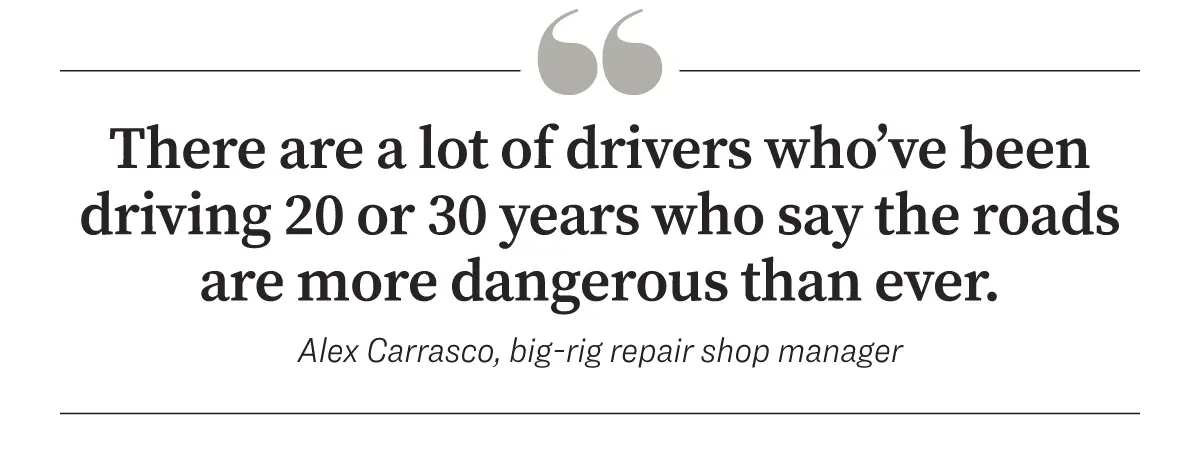
Alex Carrasco manages a busy big-rig repair shop at Little America. He believes that when commercial license holders are not properly trained or identified, they put everyone else at risk.
Carrasco said stricter federal licensing rules would make it clear who is legally driving big rigs, removing any uncertainty.
“It will probably make the roads a little safer. There are a lot of drivers who’ve been driving 20 or 30 years who say the roads are more dangerous than ever,” Carrasco said.

